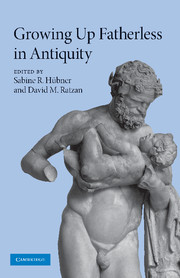Book contents
- Frontmatter
- Contents
- List of figures
- List of tables
- List of contributors
- Acknowledgments
- Note on abbreviations
- INTRODUCTION
- 1 Fatherless antiquity? Perspectives on “fatherlessness” in the ancient Mediterranean
- PART I COPING WITH DEMOGRAPHIC REALITIES
- PART II VIRTUAL FATHERLESSNESS
- PART III ROLES WITHOUT MODELS
- 8 Diomedes, the fatherless hero of the Iliad
- 9 Sons (and daughters) without fathers: fatherlessness in the Homeric epics
- 10 Absent Roman fathers in the writings of their daughters: Cornelia and Sulpicia
- PART IV RHETORIC OF LOSS
- Bibliography
- Index
8 - Diomedes, the fatherless hero of the Iliad
Published online by Cambridge University Press: 30 July 2009
- Frontmatter
- Contents
- List of figures
- List of tables
- List of contributors
- Acknowledgments
- Note on abbreviations
- INTRODUCTION
- 1 Fatherless antiquity? Perspectives on “fatherlessness” in the ancient Mediterranean
- PART I COPING WITH DEMOGRAPHIC REALITIES
- PART II VIRTUAL FATHERLESSNESS
- PART III ROLES WITHOUT MODELS
- 8 Diomedes, the fatherless hero of the Iliad
- 9 Sons (and daughters) without fathers: fatherlessness in the Homeric epics
- 10 Absent Roman fathers in the writings of their daughters: Cornelia and Sulpicia
- PART IV RHETORIC OF LOSS
- Bibliography
- Index
Summary
INTRODUCTION
In this study I will explore a literary representation of a single fatherless son, Diomedes in the Iliad. Though the Iliad cannot be used as a reliable source for the depiction of social norms and practices in any single period of Greek history, its broad influence and high status in antiquity make it an integral part of Classical culture. As children in Classical Athens studied the Iliad in school from an early age and were sometimes even required to memorize it in full, as it was regularly performed at major festivals and contests all over Greece in the Classical period, and as it is clearly alluded to in multiple ways in multiple texts and works of art, both Greek and Roman, from various periods, so we may assume that it shaped the consciousness of a broad range of different kinds of ancient audiences in powerful ways. Thus, though Diomedes represents only one view of a fatherless son and a fictional one at that, his example must have been extremely well known. In a world in which many children never knew their fathers and in many cases suffered the isolation that might go along with fatherlessness but still frequently found great social success, as is detailed in many of the chapters in this volume, the complex characterization of Diomedes in the Iliad surely had a particular resonance.
- Type
- Chapter
- Information
- Growing Up Fatherless in Antiquity , pp. 141 - 161Publisher: Cambridge University PressPrint publication year: 2009
- 1
- Cited by



